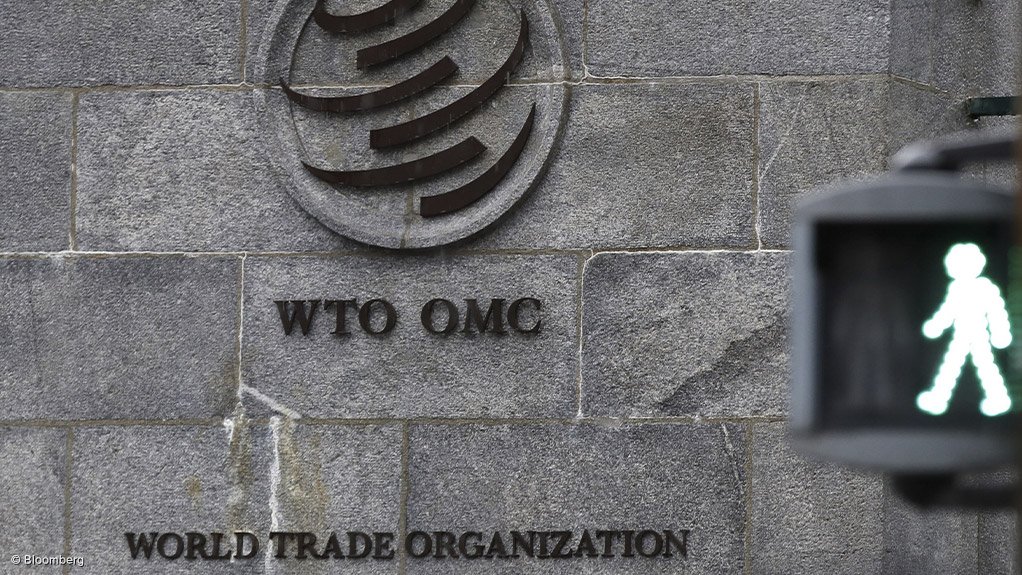Room for rules-based global trade remains, but WTO showing signs of geopolitical tension
Over the past five years, geopolitics has cast a shadow over how the world trade system functions, leading to a state of inertia within the World Trade Organisation (WTO) and its dispute resolution mechanisms.
However, while geopolitical tensions have led to many questioning the WTO system, many countries still see value in a rules-based global trade system, and there remains room for facilitating agreements on trade through the WTO as a platform.
These were some of the views raised by trade experts on the recently concluded WTO thirteenth Ministerial conference on the future of the world trade system during an April 4 webinar hosted by the South African Institute of International Affairs (SAIIA).
"The [WTO] organisation has been unable to come to any major decisions or outcomes, especially on mandated negotiations, such as on agriculture and subsidies.
"All parties are unhappy, and some are frustrated at the perceived lack of the WTO changing to meet the realities of global commerce, the reconfiguration of global supply chains and the new issues related to environmental concerns," said South Africa's ambassador to the WTO Dr Mzukisi Qobo.
"However, there are also high points, with many ascensions to the WTO, which is an indicator that countries still see value in the WTO. About four-fifths of global trade is through the WTO system, and it has had some notable achievements in agreements on trade facilitation in the recent past," he added.
Geopolitical tensions were also responsible for a decline in global trade and the recent phenomenon of friend-shoring, which is a practice of improving trade relations with countries that are politically aligned with a country, was set to dominate global supply chains, he highlighted.
There had been a noticeable rise in political proximity of trade over the past few years, and events since the end of 2022 suggested a shift to bilateral trade between countries with similar geopolitical stances, or friend-shoring, he added.
Thus, there is a risk of trade concentration along perceived geopolitical contiguity, with countries preferring to trade with countries that have ideologically contiguous trade policies.
"There is currently a backlash or antipathy to trade openness across all countries, in developing countries as well as in developed industrial economies, and considerations of democracy, sovereignty and global economic integration are clashing," Qobo noted.
Owing to a perceived lack of breathing room and sufficient space for flexibility during the Ministerial conference negotiations on fisheries and agriculture, matters came to a standstill without settling on a compromise, he added.
He illustrated that India sought a 25-year transition period for removing agricultural and fisheries subsidies, which was stridently opposed by some countries.
India has 60-million people who fall below the $1.90 a day definition of extreme poverty, although United Nations studies have indicated that about 250-million people in India experience multidimensional poverty. For many in India, fisheries and agriculture are sources of livelihoods.
"India felt it was too high a price, mid-elections, to part with the request for flexibility," Qobo said.
However, developing countries that are delaying or blocking resolutions during these negotiations, such as India and South Africa, are not calculating the costs of the fragmentation of global trade, emphasised WTO Chair in Brazil and Centre on Global Trade head Professor Vera Thorstensen.
"Developing countries doubt the WTO and rules, but, even if it is not exactly what we want, it can block some of the unilateral actions rich countries are taking. For example, there are no rules for digital trade, and rich countries have the power and money to convert the worth within their dominions and some enterprises are not even paying taxes within countries in which they operate.
"These types of actions are distorting the way the trade system works," she said.
Additionally, in 2008, India also stopped negotiations because it also had elections, but the party in power lost the elections and thus there was nothing to show for this, she added.
"We are living in a different world to the one the WTO was formed in, and the WTO must change," she said.
The global trade rulebook was outdated and new challenges needed to be addressed, including digitalisation, environmental, pollution and climate change issues. The multilateral approach was no longer fit for purpose for all issues, said German Institute of Development and Sustainability deputy director Dr Axel Berger.
Open plurilateral negotiations and agreements among groups of countries were present in the trade system and were not new. Open plurilateral negotiations often only placed binding commitments on those nations that had signed them, and there may be benefit to non-signatories as well, he said.
However, plurilateral negotiations do create challenges for members, including agenda setting, as in some of these negotiations high-income countries can often define the agenda and what topics are negotiated.
A large number of the WTO members are developing countries and they should have a say in what was negotiated. In the context of plurilateral negotiations, the question was how to ensure the interests of developing countries were taken on board, he said.
Further, the WTO system was complex and also worked on the basis of plurilateral agreements. Some called this 'fragmentation' and others called this 'flexibility'. However, if the system was not open to plurilateral agreements, then there was a risk of extending the deadlock already in the system, said Berger.
"There is a risk that those members who are interested in certain issues will move forward with some of the issues and move out of the WTO. An example is the Investment Facilitation for Development initiative, which has two-thirds of the 126 members interested in the agreement and they could decide to move outside of WTO negotiations," he said.
It was puzzling that some developing countries were blocking progress being pursued by other developing countries, including India, South Africa and Türkiye in recent negotiations, he added.
To overcome the trust deficit in the WTO system, the starting point was to understand the problem, including why some developing countries were blocking agreements and why some rich countries were breaking the rules, said former WTO deputy director-general and trade academic Dr Harsha Vardhana Singh.
"If countries are blocking agreements or not enforcing rules, then it could lead to a breakdown in the rules system and weaken global trade organisations in terms of inclusiveness and 'most favoured nation' status when some countries do not join.
"Part of the problem is that large initiatives create situations where all parties must agree on everything and, if this cannot be achieved, the agreements are blocked or delayed. However, this does not have to be the case, as there are some provisions that all parties would accept.
"Efforts then can be focused on securing solutions to those provisions that present challenges for some members," he said.
Further, there remained substantive work that the WTO must complete, mainly around negotiations. Some regulatory principles could be accepted and used flexibly to form guidelines and soft laws on which members could start to build a system and find ways to build out agreement, he advised.
"If negotiations keep failing, then the organisation will fail. This could affect the fundamental principles of the multilateral system and lead to greater costs for developing countries or challenges in terms of agenda setting," he said.
There had been a loss of champions for multilateralism and, if more WTO Ministerial conferences did not deliver progress, more countries were going to become frustrated with the multilateral approach and resort to regional trade or more unilateral trade policy making, said Berger.
The WTO was formed in a unipolar world, but the institution needed to be built on flexibility and not stick to the old negotiating practices of having everything on the table and countries only negotiating if they agreed to all the topics, he said.
The WTO had been blocked since 2008 and this allowed rich countries to do what they wanted, said Thorstensen.
"However, the positive is that the WTO has not been killed. This is because the Global South needs rules and the WTO presents existing rules that can be used and improved upon. Consensus must be built and is never present from the beginning," she said.
Article Enquiry
Email Article
Save Article
Feedback
To advertise email advertising@creamermedia.co.za or click here
Press Office
Announcements
What's On
Subscribe to improve your user experience...
Option 1 (equivalent of R125 a month):
Receive a weekly copy of Creamer Media's Engineering News & Mining Weekly magazine
(print copy for those in South Africa and e-magazine for those outside of South Africa)
Receive daily email newsletters
Access to full search results
Access archive of magazine back copies
Access to Projects in Progress
Access to ONE Research Report of your choice in PDF format
Option 2 (equivalent of R375 a month):
All benefits from Option 1
PLUS
Access to Creamer Media's Research Channel Africa for ALL Research Reports, in PDF format, on various industrial and mining sectors
including Electricity; Water; Energy Transition; Hydrogen; Roads, Rail and Ports; Coal; Gold; Platinum; Battery Metals; etc.
Already a subscriber?
Forgotten your password?
Receive weekly copy of Creamer Media's Engineering News & Mining Weekly magazine (print copy for those in South Africa and e-magazine for those outside of South Africa)
➕
Recieve daily email newsletters
➕
Access to full search results
➕
Access archive of magazine back copies
➕
Access to Projects in Progress
➕
Access to ONE Research Report of your choice in PDF format
RESEARCH CHANNEL AFRICA
R4500 (equivalent of R375 a month)
SUBSCRIBEAll benefits from Option 1
➕
Access to Creamer Media's Research Channel Africa for ALL Research Reports on various industrial and mining sectors, in PDF format, including on:
Electricity
➕
Water
➕
Energy Transition
➕
Hydrogen
➕
Roads, Rail and Ports
➕
Coal
➕
Gold
➕
Platinum
➕
Battery Metals
➕
etc.
Receive all benefits from Option 1 or Option 2 delivered to numerous people at your company
➕
Multiple User names and Passwords for simultaneous log-ins
➕
Intranet integration access to all in your organisation




















